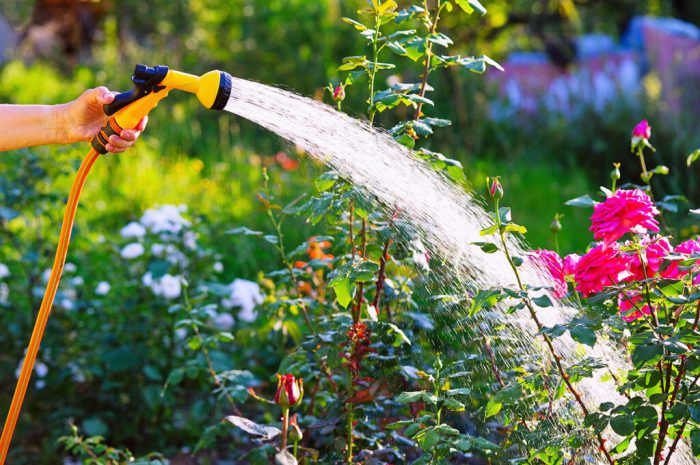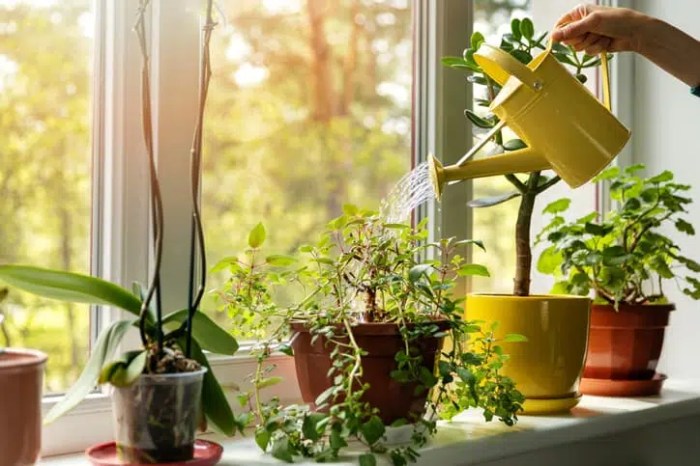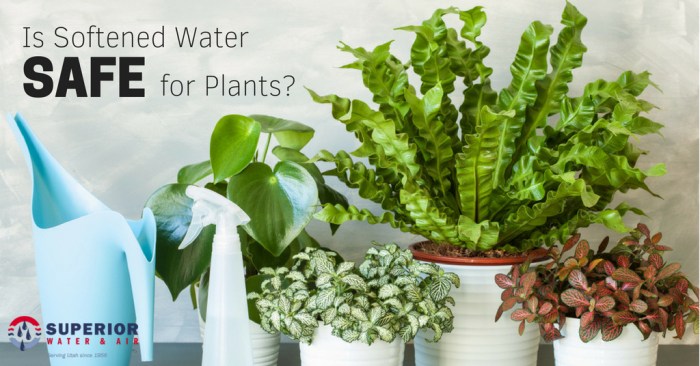Can You Water Your Plants With Softened Water?
Watering Plants with Softened Water
Can you water your plants with softened water – The use of softened water for household purposes, including watering plants, is a common practice. However, the impact of softened water on plant health is a subject worthy of consideration. This article explores the composition of softened water, its effects on plant growth, alternative watering methods, and the long-term implications of its use.
Softened Water Composition

Source: waterdepot.com
Softened water differs significantly from hard water in its mineral content. Hard water contains high concentrations of minerals like calcium and magnesium, while softening processes remove these minerals, often replacing them with sodium.
The water softening process typically involves ion exchange, where calcium and magnesium ions are exchanged for sodium ions. This dramatically alters the mineral profile of the water.
High sodium levels can be detrimental to plant health, impacting nutrient uptake and potentially leading to salt stress. While sodium is a necessary nutrient in small amounts, excessive amounts can disrupt the delicate balance of minerals within the plant’s cellular environment.
| Mineral | Hard Water Concentration | Softened Water Concentration | Impact on Plant Growth |
|---|---|---|---|
| Calcium (Ca) | High | Low | Essential for cell wall structure and many enzyme functions; deficiency leads to stunted growth and weak stems. |
| Magnesium (Mg) | High | Low | Crucial for chlorophyll production; deficiency results in chlorosis (yellowing of leaves). |
| Sodium (Na) | Low | High | Can be toxic in high concentrations, leading to salt stress and reduced nutrient uptake. |
| Potassium (K) | Variable | Variable | Essential for water regulation and enzyme activation; deficiency can cause wilting and reduced fruit production. |
Effects of Softened Water on Plant Growth
Essential minerals, particularly calcium and magnesium, play vital roles in plant development. Calcium contributes to cell wall strength and stability, while magnesium is crucial for chlorophyll synthesis. A deficiency in these minerals, common with softened water, can negatively impact plant health.
The lack of essential minerals from softened water can manifest in various ways, including stunted growth, chlorosis (yellowing of leaves), weakened stems, and reduced fruit or flower production. The severity of these effects depends on the plant species and the duration of exposure to softened water.
- Tomato plants: Relatively sensitive to softened water, showing signs of mineral deficiency.
- Roses: May exhibit chlorosis and reduced flowering.
- Succulents: Generally more tolerant due to their adaptation to arid conditions and lower mineral requirements.
- Ornamental grasses: Often show tolerance to softened water.
Alternative Watering Methods

Source: rainwaterlv.com
Rainwater, distilled water, and well water offer alternatives to softened water for plant irrigation. Each has a unique mineral composition and pH level.
Rainwater is generally soft and slightly acidic, often lacking in minerals. Distilled water is essentially mineral-free. Well water can vary greatly in mineral content and pH, sometimes being quite hard. Adjusting watering frequency is crucial; plants watered with mineral-poor water might require less frequent watering to avoid overwatering.
Testing the pH and mineral content of water sources can be done using readily available home testing kits. These kits provide simple instructions and typically measure pH using indicator strips or electronic meters. Mineral content can be assessed using water testing strips which measure the concentration of various minerals.
Long-Term Effects of Using Softened Water

Source: superiorwaterandair.com
The exclusive use of softened water can have several long-term negative consequences for plants and soil. These effects accumulate over time, impacting plant health and soil fertility.
- Root Health: Reduced calcium availability can lead to weaker root systems, making plants more susceptible to diseases and drought stress.
- Leaf Development: Magnesium deficiency can result in chlorosis (yellowing of leaves), reducing photosynthetic capacity.
- Overall Plant Vigor: A combination of mineral deficiencies can lead to stunted growth, reduced flowering, and decreased fruit production.
Soil amendment is crucial to counter mineral deficiencies. Adding organic matter, such as compost or well-rotted manure, provides a slow-release source of essential minerals. Specific mineral supplements, like calcium and magnesium sulfate, can also be applied to address specific deficiencies.
Visual Representation of Plant Health, Can you water your plants with softened water
Plants watered with hard water typically exhibit robust growth, with dark green, healthy leaves. Stems are strong, and overall plant structure is well-developed. In contrast, plants watered exclusively with softened water may show signs of chlorosis (yellowing of leaves), particularly between the leaf veins. Leaf margins may become scorched, and stems might be weaker and more prone to breakage. Overall, the plants will appear stunted and less vigorous.
Visual signs of mineral deficiency in plants watered with softened water include pale or yellow leaves (chlorosis), especially in younger leaves, stunted growth, leaf curling, and brown leaf edges. The severity of these symptoms depends on the plant species and the duration of exposure to softened water.
FAQ Resource: Can You Water Your Plants With Softened Water
What are the visual signs of overwatering plants with softened water?
Overwatering, regardless of water type, can lead to yellowing leaves, wilting, and root rot. With softened water, you might also see a general lack of vigor and stunted growth due to mineral deficiencies.
While softened water lacks beneficial minerals, it’s generally acceptable to water plants with it, though not ideal. The frequency of watering is just as important; you might wonder, “can you water plants twice a day?”, and the answer often depends on factors like plant type and climate. Consider consulting resources like this helpful article on watering frequency: can you water plants twice a day.
Ultimately, the best approach for using softened water involves monitoring your plants closely and adjusting watering frequency accordingly.
Can I use a water softener for all my plants?
No, some plants are more sensitive to mineral deficiencies than others. Experiment with small batches of plants to determine tolerance before watering your entire garden with softened water.
How often should I test my water’s pH and mineral content?
Regular testing, ideally every few months, is recommended, especially if you notice changes in plant health. This helps you monitor the effects of your watering practices and make necessary adjustments.




















